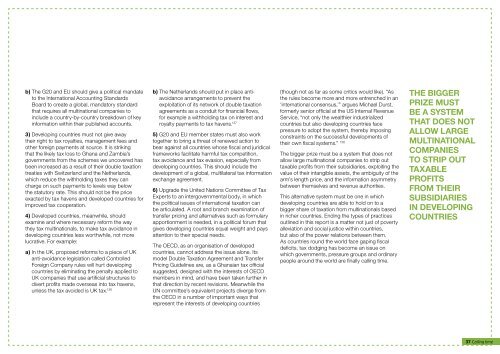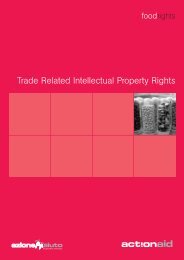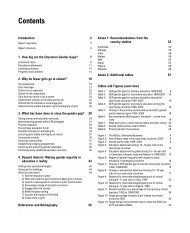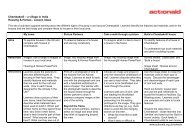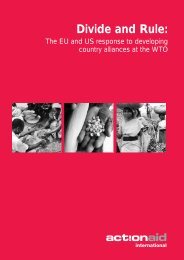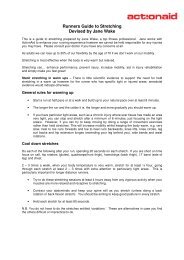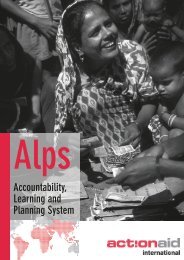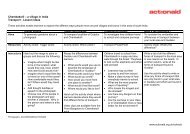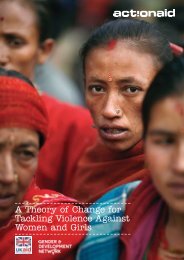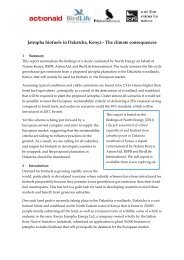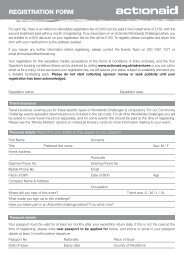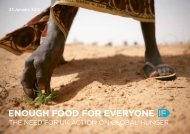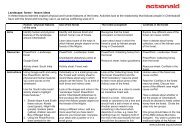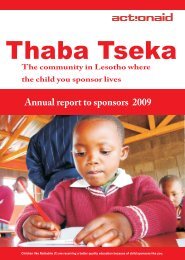Create successful ePaper yourself
Turn your PDF publications into a flip-book with our unique Google optimized e-Paper software.
) The G20 and EU should give a political mandate<br />
to the International Accounting Standards<br />
Board to create a global, mandatory standard<br />
that requires all multinational companies to<br />
include a country-by-country breakdown of key<br />
information within their published accounts.<br />
3) Developing countries must not give away<br />
their right to tax royalties, management fees and<br />
other foreign payments at source. It is striking<br />
that the likely tax loss to Ghana and Zambia’s<br />
governments from the schemes we uncovered has<br />
been increased as a result of their double taxation<br />
treaties with Switzerland and the Netherlands,<br />
which reduce the withholding taxes they can<br />
charge on such payments to levels way below<br />
the statutory rate. This should not be the price<br />
exacted by tax havens and developed countries for<br />
improved tax cooperation.<br />
4) Developed countries, meanwhile, should<br />
examine and where necessary reform the way<br />
they tax multinationals, to make tax avoidance in<br />
developing countries less worthwhile, not more<br />
lucrative. For example:<br />
a) In the Uk, proposed reforms to a piece of Uk<br />
anti-avoidance legislation called Controlled<br />
Foreign Company rules will hurt developing<br />
countries by eliminating the penalty applied to<br />
Uk companies that use artificial structures to<br />
divert profits made overseas into tax havens,<br />
unless the tax avoided is Uk tax. 136<br />
b) The Netherlands should put in place antiavoidance<br />
arrangements to prevent the<br />
exploitation of its network of double taxation<br />
agreements as a conduit for financial flows,<br />
for example a withholding tax on interest and<br />
royalty payments to tax havens. 137<br />
5) G20 and EU member states must also work<br />
together to bring a threat of renewed action to<br />
bear against all countries whose fiscal and juridical<br />
frameworks facilitate harmful tax competition,<br />
tax avoidance and tax evasion, especially from<br />
developing countries. This should include the<br />
development of a global, multilateral tax information<br />
exchange agreement.<br />
6) Upgrade the United Nations Committee of Tax<br />
Experts to an intergovernmental body, in which<br />
the political issues of international taxation can<br />
be articulated. A root and branch examination of<br />
transfer pricing and alternatives such as formulary<br />
apportionment is needed, in a political forum that<br />
gives developing countries equal weight and pays<br />
attention to their special needs.<br />
The OECD, as an organisation of developed<br />
countries, cannot address the issue alone. Its<br />
model Double Taxation Agreement and Transfer<br />
Pricing Guidelines are, as a Ghanaian tax official<br />
suggested, designed with the interests of OECD<br />
members in mind, and have been taken further in<br />
that direction by recent revisions. Meanwhile the<br />
UN committee’s equivalent projects diverge from<br />
the OECD in a number of important ways that<br />
represent the interests of developing countries<br />
(though not as far as some critics would like). “As<br />
the rules become more and more entrenched in an<br />
‘international consensus,’” argues Michael Durst,<br />
formerly senior official at the US Internal Revenue<br />
Service, “not only the wealthier industrialized<br />
countries but also developing countries face<br />
pressure to adopt the system, thereby imposing<br />
constraints on the successful developments of<br />
their own fiscal systems.” 138<br />
The bigger prize must be a system that does not<br />
allow large multinational companies to strip out<br />
taxable profits from their subsidiaries, exploiting the<br />
value of their intangible assets, the ambiguity of the<br />
arm’s length price, and the information asymmetry<br />
between themselves and revenue authorities.<br />
This alternative system must be one in which<br />
developing countries are able to hold on to a<br />
bigger share of taxation from multinationals based<br />
in richer countries. Ending the types of practices<br />
outlined in this report is a matter not just of poverty<br />
alleviation and social justice within countries,<br />
but also of the power relations between them.<br />
As countries round the world face gaping fiscal<br />
deficits, tax dodging has become an issue on<br />
which governments, pressure groups and ordinary<br />
people around the world are finally calling time.<br />
The bIggeR<br />
PRIze MuST<br />
be A SySTeM<br />
ThAT DoeS noT<br />
AlloW lARge<br />
MulTInATIonAl<br />
CoMPAnIeS<br />
To STRIP ouT<br />
TAxAble<br />
PRofITS<br />
fRoM TheIR<br />
SubSIDIARIeS<br />
In DeveloPIng<br />
CounTRIeS<br />
37 <strong>Calling</strong> time


